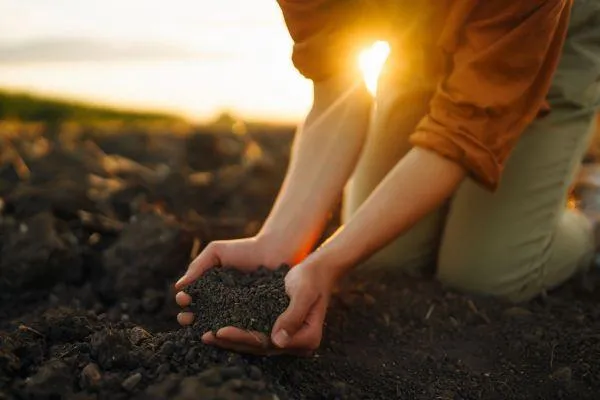
Biochar and Composting: 10 Benefits for Your Block
What is biochar?
Biochar is a form of charcoal made by heating plant material at high temperatures in a low-oxygen environment. The process is called pyrolysis. Unlike ash, which breaks down quickly, biochar is stable for hundreds to thousands of years (Rodionov et al, 2010).
Think of it as a way to take carbon out of the atmosphere and lock it into the soil. The result is a porous, carbon-rich material that can hold water and nutrients and provide a home for soil microbes.
How is biochar made?
Biochar can be made in simple pits, kilns, or specialised machines. At home scale, it is usually made in small kilns, pits, or even in a wood burner. One simple method is to use a container with small holes in it, such as an old biscuit tin, to limit oxygen while the wood chars.
For best results:
Use untreated, woody material such as prunings, branches, forestry slash, or wood-working offcuts. Avoid straight sawdust in flame-cap or pit methods, as it insulates itself and does not pyrolyse evenly. If sawdust is all you have, mix it through coarser pieces or use an enclosed retort.
Avoid painted or treated timber, which can release toxins.
Aim for the right temperature range. A minimum of about 450°C helps create stable, long-lived biochar. Around 600°C often gives higher surface area and good porosity. At very high temperatures (roughly 750°C+) pores can start to fuse, reducing internal surface area (Lehmann & Joseph, 2015).
Most lifestyle farmers will make their own biochar from prunings and branches, or buy it ready-made from a supplier. Even a single large tree can yield a surprisingly significant amount, so “home-scale” does not always mean small.
Why add biochar to compost?
Research shows biochar improves composting in many ways (Sanchez-Monedero et al, 2017). Adding 2–10% by weight is enough to make a difference.
Here are 10 benefits:
Water retention
Biochar’s sponge-like structure can hold three to four times its weight in water. In compost, this helps maintain moisture levels for microbes and prevents leaching in heavy rain.Better aeration
Because it is porous and doesn’t break down, biochar improves airflow through a compost heap. This means fewer turnings are needed to keep compost aerobic.Nutrient holding
Biochar attracts and holds nutrients. This reduces nitrogen losses during composting and improves the carbon-to-nitrogen balance in the finished product.pH balance
Biochar is alkaline, often around pH 9. Adding it helps reduce acidity and acts like a natural lime.Microbial boost
The pores in biochar are quickly colonised by bacteria and fungi. This gives microbes a safe “home” and helps keep the composting process active.Less nutrient leaching
Nutrients are better held within the compost pile rather than washing away. In wet weather, biochar can even be used around the heap as a filter to catch runoff and recycle it.Lower greenhouse gases
Composting can produce methane and nitrous oxide, which are powerful greenhouse gases. Biochar reduces anaerobic spots in the heap, cutting these emissions (Yin et al, 2021).Carbon sequestration
Because biochar doesn’t break down, every time you add it to your soil you are locking away carbon for the long term. The IPCC lists biochar as one of the few scalable carbon drawdown methods.Hard to buy, easy to make
Compost with added biochar is not widely sold in New Zealand. Making your own means you get the benefits without extra cost.Odour reduction
Biochar reduces ammonia and hydrogen sulphide smells, making composting more pleasant and neighbour-friendly.
Using biochar on your block
Add 2–10% by weight to compost heaps or worm farms.
Use woody waste from pruning or clearing to make a decent amount.
Buy biochar if you want consistent quality without the hassle of making it.
For lifestyle farmers, the most practical way to use biochar is to add it to composting systems. Even a modest amount can supercharge the process, boosting water retention, nutrient holding, and microbial activity with a cascade of benefits.
Fire safety and biochar
If you make biochar yourself, remember the same safety rules as any fire use on a block:
Only burn untreated wood.
Keep fire-fighting equipment handy.
Never leave a burn unattended.
Quench the biochar carefully. Water is usually used to stop the charring process, but add it slowly to avoid dangerous bursts of steam.
For more detail, see our free Rural Fire Safety Guide
Conclusion
Biochar is not new. Research is confirming what gardeners have noticed for years: it makes compost work better and soil healthier. Whether you make a batch from prunings or buy it ready-made, adding biochar to your compost could be a worthwhile step for your block.
LSB would like to thank Dylan Graves of Biochar Network New Zealand for his assistance in creating this article.
For more information on Biochar and its benefits read Biochar benefits composting in 10+ ways on the Biochar website.
Update 2026: Current garden advice is that animal amendments (such as manure, blood and bone etc) to soil around edibles should be sterilised (aging it or home composting it - which doesn't kill off pathogens - is no longer sufficiently safe).

